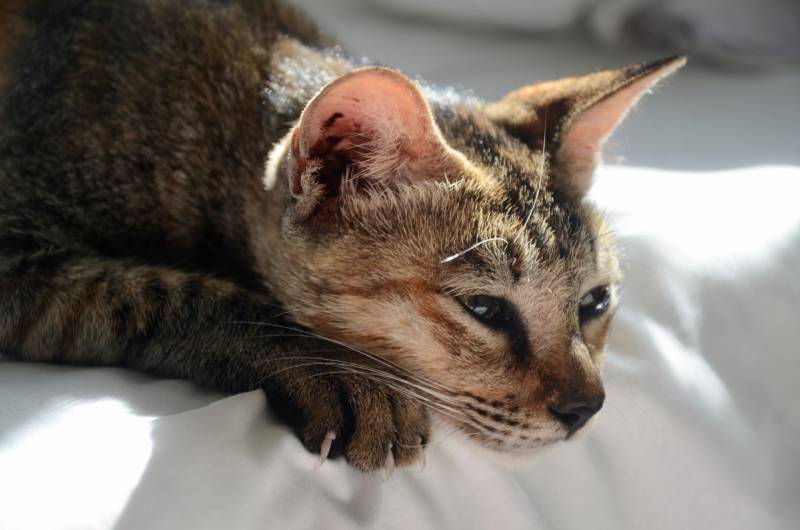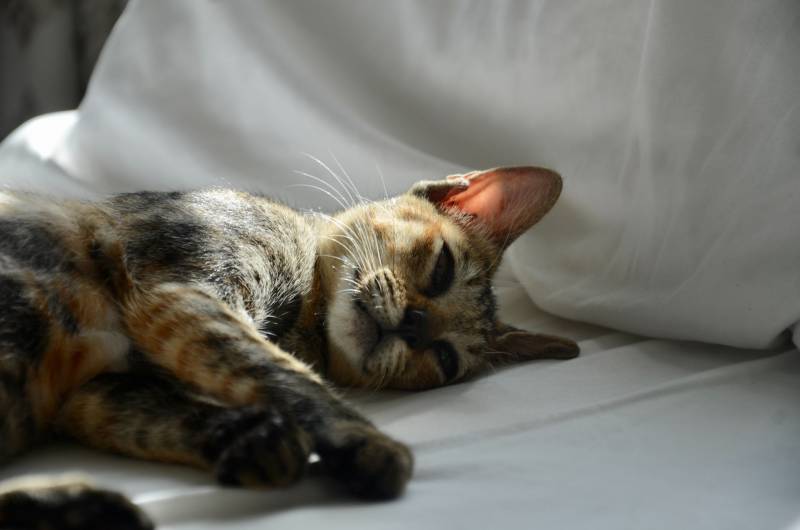Quick Navigation
Cats are some of the strongest pets.
Because of their wild survival instincts, cats rarely show up when they are ailing unless the situation is unbearable.
So, if you notice that your cat is in some pain, you have to find out why.

Like all other pets, cats also contract different diseases and injuries.
One of the common problems that cats face is stomach spasms.
If you think your cat is ailing from stomach spasms, you should take it to a veterinarian for diagnosis.
Failure to do so, your cat may even suffocate to death.
Here are some of the causes and solutions for stomach spasms in cats:
Bowel Obstruction
One of the common causes of stomach spasms in cats is bowel obstruction.
This blockage leads to the restriction of secretions and nutrients within the stomach and intestinal area.
This condition is usually very painful as it can reduce blood flow.
On top of that, it can lead to tissue necrosis.
Pets who have bowel obstructions may die within 3 to 7 days.
What’s The Solution?
The solution for bowel obstruction is to get rid of the objects that are restricting nutrients and secretions.
Without a veterinarian’s supervision, never attempt to make your cat vomit on your own.
Your cat will need urgent surgery to remove the obstruction when your vet confirms that it has an intestinal obstruction.
In some cases, the vet will also remove the damaged tissues.
Stomach Ailment
Stomach problems are another common cause of stomach spasms in cats.
It is also known as gastritis and is usually caused by food intolerance.
It can also make your feline vomit, have diarrhea, and have stomach pain.
What’s The Solution?
The good news is that gastritis can be treated at home. Treat your cat by withholding food for 8 to 12 hours.
Next, give the cat small amounts of water for the next 24 hours. If the cat vomits, take it to a vet.
But if not, give it a small amount of highly-digestible food, and finally, slowly increase the amount of food.
If vomiting returns, take it to a vet.
Pneumonia
Pneumonia can also cause your furry friend to have stomach spasms.
This ailment is usually caused by a viral infection of the lower respiratory tract.
Other causes of pneumonia in cats include forced feeding, persistent vomiting, and wrongly administered medicines.
What’s the Solution?
If you suspect that your feline friend is suffering from stomach pain because of pneumonia, you should take it to the vet.
The veterinarian will do some tests and match them with the best medicine.
Parasitic Diseases
If parasites have invaded your cat, there is a high chance that it will have abdominal spasms.
One of the most common intestinal parasites in cats is the roundworm.
These worms typically weaken the cat and make it susceptible to viral and bacterial infections.
They cause vomiting, nausea, and much more.
What’s The Solution?
Apart from periodic deworming, you will also have to keep your cat’s environment clean all the time.
For instance, you will have to clean the cat’s stool properly, keep the area clean, prevent contact between your cat and foreign cats, and visit the vet if the roundworms persist.
Bacterial Infection
A bacterial infection in your cat can make it undergo excessive pain, vomiting, stomach spasms, abdominal cramping, fever, nausea, and even diarrhea.
So, you should work fast to ensure that you get rid of bacterial infections in your furry friend.

What’s The Solution?
You cannot treat this condition at home. You will have to call your vet and have them diagnose your cat.
Usually, the vet will treat such infections using antibiotic drugs.
And if the cat is excessively dehydrated, it may use fluids in the treatment.
Pancreatitis
Pancreatitis is another condition that leads to stomach spasms.
It is because the inflammation caused by this disease leads to inflammation and potential damage to your intestines and liver.
Also, pancreatitis causes sharp pain, which is very unbearable to these adorable creatures.
What’s The Solution?
If your cat has abdominal discomforts such as stomach spasms because of pancreatitis, you will have to see a vet.
However, early nutritional support can help to lower the pain that your feline friend may undergo.
Poisoning
Poisoning is also another common reason why your cat may be having stomach spasms.
Nonetheless, a poisoned cat will show other symptoms, including pale blue gums, difficulty breathing, vomiting, and much more.
What’s The Solution?
Unlike most causes of stomach spasms on this list, poisoning can be treated from home.
You will have to administer ethanol, give the cat fluids, give it muscle relaxants & anti-seizure medication, and induce vomiting.
However, if the situation persists, take it to a veterinarian.
Ruptured Bladder
Last but not least, a ruptured bladder can also lead to stomach spasms.
It is because it causes urine to fill in the abdomen of your feline.
What’s The Solution?
If you notice that your cat’s bladder has burst, it is essential to visit the vet right away. It doesn’t have a home remedy.
How Does A Veterinarian Diagnose A Cat With Stomach Spasms?
The veterinarian will start by requesting a complete medical history of your cat.
They will also perform a thorough physical test that may lead to further diagnostic testing.
Therefore, you should provide the vet with precise information to help them pinpoint the issue faster.
Some of the questions the vet will ask to include the last food the cat ate.
Exposure to dangerous substances? The state of the cat a few days before? A change in character or posture?
And a lot more. If your vet cannot identify the disease or condition based on your information, he/she will perform additional tests.
Some of the standard tests done include a biochemical profile, complete blood count, and a urinalysis.
These tests are typically performed to determine signs of infection or inflammation.
Aside from the above tests, a fecal test can also be carried out if parasites are suspected.
When such a test is performed, an ultrasound or x-ray is also taken.
It helps to see if there is any inflammation, ruptures, or tumors in the body organs.
On top of that, the vet may also check the type of fluid in the stomach by conducting a biopsy or a peritoneal fluid analysis.
What Are The Signs Of Stomach Spasms Or Abdominal Pain In Cats?
After looking at the causes and solutions of stomach spasms in cats, it is also important to know the signs.
Here are some of the common signs of stomach spasms in cats:
- Lethargy
- Vomiting
- Trouble urinating
- Diarrhea
- Loss of weight
- Blood in feces
- Breathing quickly or irregularly
- Change in appearance or posture
If you notice one of the above signs, this is an indication that your cat is suffering.
Don’t waste any time and visit your vet to have the cat checked right away.
Final Thoughts
With the above information, you should tell whether your cat is suffering from stomach spasms or just simple abdomen pain.
No matter the situation, it is vital to take your feline for a checkup if they are experiencing any sort of pain.
As mentioned above, some causes of feline stomach spasms can be identified at home, while others require medical attention.
Also, knowing the signs of stomach spasms or abdominal pain is crucial so that you don’t confuse it with another sickness.
Now that you know what to do if your cat has stomach spasms, make sure he or she is well-fed and cared for.

Purrfect n’ Pawesome is the brainchild of Amanda, who has been into researching and writing about pets to help other pet parents in nurturing their adorable pets. Currently, she runs Purrfect n’ Pawesome along with her team of experienced and dedicated pet experts. Along with being an awesome writer and entrepreneur, Amanda is a cat mom to two innocently spoiled cats, Balanca and Scruffy.
She has been writing about pet care and nurturing and wants to share her readers’ experiences, learnings, and knowledge.
Over the years, she had the opportunity to work with various pet owners having multiple breeds, and that exposure gave her experience and the lessons of a lifetime.
Her family, her entire universe revolves around her two cats, who give her endless support and inspiration to move ahead with her objectives in life. Amanda is a live example of a balanced approach to all parenthood questions we all face in life.

